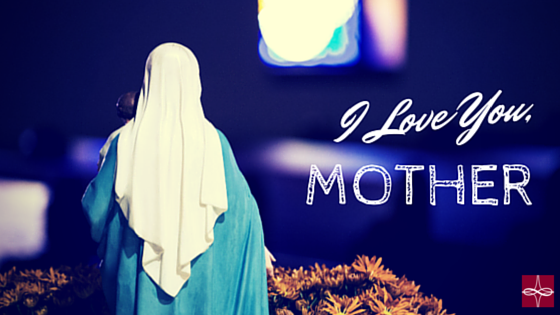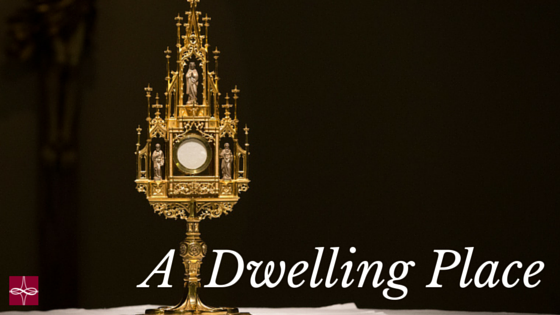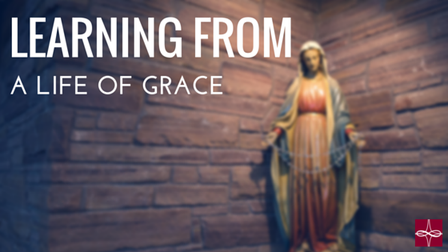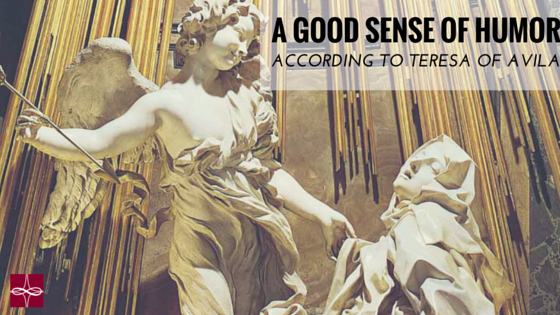|
“Don’t forget to call your mother!”I’m often prompted by my family, especially my mom, whenever I call home. In remembering to take the time and effort to do so, I strengthen our relationship through this simple sign of love and reaffirm my devotion to her and the rest of the family. No matter how my life is going at any particular time, it is an immense comfort and relief to be able to call upon her and share with her my struggles and shortcomings that I’m otherwise tempted to keep suppressed within myself. While not everyone is blessed to have such a grounding in their family life, they can always turn to their Heavenly Mother with petitions and struggles, in times of strength or trial. One of the most widely recognized ways of doing this is through the recitation of the most Holy Rosary, traditionally believed to have been devised by St. Dominic after experiencing a vision of the Blessed Virgin Mary. An optional devotion, the Rosary has nonetheless been instrumental for countless Catholics in the formation of their prayer lives and spirituality as a whole. It is wonderfully beautiful, not only as expressed in the many styles a Rosary is made in, but in the simple order of its composite prayers and the non-necessity of having to recite it in a specified space or time. Each decade of the Rosary invites us to reflect on and participate in a mystery in the ever-joined lives of Christ and His Mother--in the words of St. John Paul II, “it has all the depth of the Gospel message in its entirety.” In a culture where having structure and taking one’s time are abnormal, the Rosary makes no sense. I’ve heard it said once that instead of moving us quickly from one end to another end without pause, the Rosary, by contrast, forces us to take our time in our contemplation before ultimately ending up where we started (at the beginning of the circle)! The repetition of each “Hail Mary”is a unique expression of love for our Mother. As Bishop Sheen noted in “The World’s First Love”: The beautiful truth is that there is no repetition in, “I love you.”Because there is a new moment of time, another point in space, the words do not mean the same as they did at another time or space. Love is never monotonous in the uniformity of its expression. The mind is infinitely variable in its language, but the heart is not. The heart of a man, in the face of the woman he loves, is too poor to translate the infinity of his affection into a different word. So the heart takes one expression, “I love you,”and in saying it over and over again, it never repeats. It is the only real news in the universe. That is what we do when we say the Rosary, we are saying to God, the Trinity, to the Incarnate Saviour, to the Blessed Mother: “I love you, I love you, I love you.”Each time it means something different because, at each decade, our mind is moving to a new demonstration of the Saviour’s love. Like many others, when I first began praying the Rosary, I was disheartened by its length and repetition and so did not fully grasp all of the spiritual benefits it offered. As I sought to deepen my prayer life, however, I gradually dedicated myself more fully into its recitation, and only then did I start to understand the weight of each word I uttered. In honoring Mary, we honor Christ; through Mary we receive God’s graces and our intercessions pass. Especially during October, the month of the Rosary, let us maintain this great weapon of the Faith in our spiritual battles, keeping it at our side--in our pockets--and praying it with devotion, patience, and humility always.
0 Comments
I have always had a special admiration for St. Jude. Growing up, my home parish was the Church of St. Jude. I can still remember my mom telling me to pray to the saint whenever I felt that I was facing an impossible task. Legend says that since his name was so close to that of Judas, many people did not pray to him, for fear of confusing the two. To show his thanks to people who did remember him, St. Jude was willing to be extra fervent in bringing the faithful’s requests to the Lord. In John’s Gospel, towards the end of the Last Supper, Christ observes that soon he will no longer be with his disciples, but that he will soon reveal himself. Jude asks Jesus, “Master, [then] what happened that you will reveal yourself to us and not to the world?” (John 14:22) Our Lord responded, “Whoever loves me will keep my word, and my Father will love him, and we will come to him and make our dwelling with him” (John 14:23). He is telling his disciple, and us, that whoever holds God’s teachings in his or her heart and acts accordingly is filled with the Spirit of the Lord. The Feast of Sts. Simon and Jude remind us all to be God’s dwelling place. While we do not know much about the lives of either saint, tradition tells us that Simon was called the Zealot in the gospels and Acts (Lk 6:15; Acts 1:13). There is some debate to whether this means he was an ardent disciple of Jesus or that he was a former member of the Zealot sect that advocated for the violent overthrow of the Roman occupation. If the latter is to be believed, then Simon truly demonstrates that no one is beyond becoming a dwelling place of the Lord. The Zealots were known to use violence to advocate noncompliance with the Roman authorities. Nevertheless, tradition and legend hold that Simon helped to spread the Good News, peacefully, through much of the Middle East. It was that conversion of heart that truly made Simon a dwelling place of the Lord. Legend tells us that both saints suffered martyrdom while spreading the faith in Syria. Tradition holds that Simon was either crucified or sawed in half while Jude was clubbed to death or beheaded by an axe. Yet, in the face of adversity and hostility, they continued to profess the faith that had been revealed to them until the very end. So, the question remains: How do we become God’s dwelling place? The answer is simple – follow what Jesus told St. Jude at the Last Supper: love the Lord and keep His Word. When we accept and follow the Word of God, He truly and fully enters into our lives. By keeping His word on our minds and in our hearts, we make ourselves His dwelling place. Sts. Simon and Jude truly became dwelling places of God. What happens when God resides with someone? He or she becomes so full of God’s love that it must be spread. That is what happened to Sts. Simon and Jude and that is what is possible for all of us. By following their example, we, too, can be an outpouring of God’s love to others and help build up His kingdom. Victor David is a collaborator with the Catholic Apostolate Center and a staff member at The Catholic University of America in Washington, DC. -- The St. Jude Shrine is located in the heart of Baltimore, Maryland, and has been operated and staffed by the Pallottine Fathers and Brothers for over 80 years. The Archbishop of Baltimore entrusted the Shrine to the Pallottines in 1917. Regular Novena Services were established around the outset of World War II, when devotion to St. Jude reached remarkable proportions. Today, St. Jude Shrine is the Nationwide Center of St. Jude Devotions. Like the St. Jude Shrine on Facebook.
The St. Jude Shrine is a ministry of the Society of the Catholic Apostolate - Immaculate Conception Province. Learn more by visiting http://www.sacapostles.org/our-ministries.html. In high school I had a teacher who kept a cute frog sticker on the ceiling above the doorway to and from the classroom. Her favorite saying was, “FROG it!” F-R-O-G stood for, “Fully Rely On God.” Whenever someone expressed anxiety, sadness, or some other emotion, our teacher would tell us to FROG it. Her ceiling sticker was a reminder for us to place our burdens in God’s hands and trust that he would guide us through our triumphs and tribulations. Oh how quickly we stumble and forget this trust in God’s plan for us. The last semester of my senior year of college, I had so much anxiety over finding a job. No matter what my family or friends said to encourage me, I worried 24/7. At one point, I even made myself sick by not getting enough sleep over several days. My mother told me to pray whenever I felt anxious, and to leave my future in God’s control. While I still thought constantly about the vast openness my future held after graduation, reminding myself that God had my back was reassuring. Over spring break, I visited an organization I had interned with previously. They were looking to fill a position fitting my interests and area of study. I was called a few weeks later and offered the position. Six years. That’s at least how long I can think back to decisions and opportunities God placed in my life that laid the foundation for my first job. When I reflect on this incredible plan, I can only be filled with wonder and thankfulness. Being patient for God’s timing is extraordinarily difficult, but well worth the wait. So often we want what we desire immediately, not later. Sometimes we can be so stubborn and get in the way of God’s timing by choosing the wrong decision, acting too quickly, telling God “no,” and even forgetting God at times. God uses the time of waiting to stretch our faith in him. We develop patience, a fruit of the Holy Spirit, through practice and under trial (CCC 1832). We can begin to feel satisfied as we practice this virtue. If God followed our timing, we wouldn’t grow and develop in our relationship with God or with others. In the book of Exodus, we learn how long the Israelites had to wait for God to lead them to the Promised Land. God led the Israelites on the longer journey out of Egypt to the Promised Land because they were not yet ready to place their full trust in him or his plan (Exodus 13:17-18). God also knows that if we knew how long or what it takes to reach the end, we may tire or fall from his path for us. In Ecclesiastes 3:1, we learn there is a time for everything. Seeing others around us experiencing fruitfulness while we are in drought should not cause jealousy. We must remember that these individuals may have already experienced growth or difficult stages that we currently face if we are to receive the bounty. These words from Psalm 37 remind me to place my trust in God and in his desire to fulfill my heart’s desires: “Find your delight in the Lord who will give you your heart’s desire. Commit your way to the Lord; trust in him and he will act. And make your righteousness shine like the dawn, your justice like noonday. Be still before the Lord; wait for him. Do not be provoked by the prosperous, nor by malicious schemers.” - Psalm 37:4-7 Our jobs are not to decipher when what we seek will come to fruition. Our jobs are to continue praying and seeking the result, trusting in God’s plan and asking him for the strength to participate in it. We mustn’t give up. God works things out in his own perfect timing. Did you know that as Catholics we commemorate the month of October as the month of the rosary? The rosary calls us to reflect on the life of Christ through the intercession of Mary, our Blessed Mother. The rosary is an invitation for us to build a relationship with Mary, so that we can better know her son. St. Thomas Aquinas once said, “As mariners are guided into port by the shining of a star, so Christians are guided to heaven by Mary.” One way to get to know Mary is by reading about her life from scripture. Mary’s words are not recorded often, and her actions seem to skim by even more subtly. Even so, the presence of her words and actions are profound, calling us to a deeper relationship with her and her son.
First, we learn from Mary that it is okay to ask questions on our faith journey. When the angel Gabriel announces to her that she will be the mother of the Son of God, she simply asks, “How can this be, since I have no relations with a man?” (Luke 1:34). To know ourselves and have confidence in what we believe, we should always be asking questions. As a teacher, I encourage my students to ask questions all of the time. Although I am not as good as I want to be myself, from Mary I can take courage to ask more questions so that I can learn and grow in hopeful faith. When Mary questioned the angel, she learned: “Nothing will be impossible for God” (Luke 1:37). And from there, we are called to take Mary’s example of humility and trust in her “Fiat” when she says, “Behold, I am the handmaid of the Lord. May it be done to me according to your word” (Luke 1:38). The second lesson that I have learned from Mary in the Bible has had the most profound impact on my life. After the birth of her son, and in the presence of the shepherds and angels, Luke records that “Mary kept all these things, pondering them in her heart” (Luke 2:19). For me, this calls me to a life of deep reflection and intimacy with God. What I keep in my heart can move me closer to God if I invite him to share it with me: the goodness of each day, the little and big miracles, and even the hard and difficult trials. With God, everything is divine and happens with purpose; it is how I react, reflect, and let him mold me with the contents of my heart that I can become most pure. Mary is the perfect model of this. She remembers God’s glory, and holds it fast to her heart. Her life is characterized by this. I want to revel in God’s glory in all things like Mary, so that I can share this joy and love with others, and trust in his goodness when trials arise. Finally, Mary’s last words in the Bible occur at the Wedding of Cana when the reception has run out of wine. She tells her son of his time to perform his first miracle, "They have no wine" (John 2:3), and it seems as though Jesus is not convinced. But next, Mary tells the servers, “Do whatever he tells you” (John 2:5) with the utmost simplicity and confidence. Not only does she know that he is capable of great things, but she knows that her son will do great things. And so we must “do,” too. This message – “do whatever he tells you” – is a call for all of us to follow the words of Christ. Mary can only lead us to her son if we submit to his will with the trust and confidence she has modeled for us. Like Mary, we too must live our life as a Fiat, “Lord, let it be done to me according to your word.” What beautiful gifts Mary gives to us to know her faith and to let her mold us to be more like her son. Do not be afraid to let Mary be the one to lead you to Christ. She is perfect, in that she knows how to live her life for God: “Mary’s greatness consists in the fact that she wants to magnify God, not herself” (Deus Caritas Est, 41). Let her help you magnify the Lord. Today I will be praying the “Magnificat,” which is found in Luke. It is Mary’s prayer of joy and thanksgiving to God. Please join me in asking for Mary’s guidance towards her son, to lead us to a life full of grace as hers. Mary’s Magnificat “My soul proclaims the greatness of the Lord, my spirit rejoices in God my Savior for he has looked with favor on his lowly servant. From this day all generations will call me blessed: the Almighty has done great things for me, and holy is his Name. He has mercy on those who fear him in every generation. He has shown the strength of his arm, he has scattered the proud in their conceit. He has cast down the mighty from their thrones, and has lifted up the lowly. He has filled the hungry with good things, and the rich he has sent away empty. He has come to the help of his servant Israel for he remembered his promise of mercy, the promise he made to our fathers, to Abraham and his children forever.” Luke 1:46-55 Alyce Shields is a teacher in Washington, D.C. In my adult years, I have often turned to St. Teresa of Avila as a spiritual mother. I love her courage, her passion, her wit, and her boldness. Throughout her life, she was always on the go. She was a reformer who brought the Carmelite Order back to its original roots. She got things done, founding over fifteen monasteries. And yet she was a great mystic--a woman who received beautiful graces, revelations and experiences of God in profound ways that are hard to tangibly explain. She went into ecstasies as a result of her deep relationship with the Lord and wrote a book called The Interior Castle about the journey of faith leading to union with God. I love the synthesis of the practical and the mystical in her personality. This synthesis becomes more compelling in our lives today, for it reveals that we are capable of a deep interior life and relationship with God in the midst of the busyness of life.
There is a story about Teresa of Avila that has caused me to laugh in genuine appreciation of her character. According to tradition, Teresa fell off her donkey while journeying to visit one of her convents--causing her to land in the mud and dirty her Carmelite habit. With her quick, fiery Spanish temper, Teresa looked up to heaven and said to God, “If this is how you treat your friends, no wonder you don’t have many.” I love this story because it beautifully depicts St. Teresa’s humanity and honest relationship with God. It is a raw, unfiltered moment of frankness that I believe is an example of both true prayer and transparency in our relationship with God. If prayer is ongoing dialogue with God through words, thoughts or actions, what is Teresa’s statement if not prayer? She talks to God with confidence and trust. She is bold about her feelings, knowing that God can handle her honesty. Notably, where does Teresa turn first in her day to day life? To God. He is her crutch, her foundation, even in times of frustration and annoyance. He is at the forefront of her mind. When I first heard this anecdote, I could completely relate to St. Teresa. Like her, I fall down on the road towards holiness. Furthermore, I often catch myself blaming God for different moments of hardship and frustration. What we sometimes miss as we lie there in the mud is the hand that’s in front of us--the extended hand of Christ that I often imagine in the story of the woman caught in adultery who Jesus saves from being stoned. God is not the one who pushes us down, but he is the one who picks us up. How quick are we to reach for the outstretched hand? Do we even reach out for it? Or are we too proud, choosing to try to get up by ourselves? What did St. Teresa do? In one of her reflections, she writes, “I praise the mercy of God, for it was he alone who gave me his hand.” (Life, Ch 7, The Collected Works of St. Teresa of Avila, Volume One, ICS Publications, Washington D.C. 1987) Do we turn immediately to God in our day to day lives? This is a question we can all reflect upon. Taking our reflection a step further, do we respond to the situations in which we find ourselves with joy or a sense of humor? I believe Pope Francis and St. Teresa would have been great friends. In his homily at the canonization Mass of Junipero Serra, Pope Francis reminded us of St. Paul’s command to “rejoice always.” If we forget this call, we fall into the temptation of becoming “sourpusses”--to use Pope Francis’ term. We are called to be people of joy in the midst of suffering, not in the absence of it. It is this type of transparency in our relationship with God, this type of outlook on the life of faith, this sense of humor that helps us move forward in answering the universal call to be missionary disciples who witness to the Gospel through their encounter with those around them. Like St. Teresa, may we always have a sense of humor. May we be bold and honest in our dialogue with God. May we be apostles of joy. And may we join in saying the phrase very often attributed to her, “God protect us from sour-faced saints”! After the extraordinary visit of Pope Francis to the United States, I have a renewed vision of the world around me. I see things in ways that I had not experienced before. The Lord’s call for compassion and mercy, especially on the eve of the Jubilee of Mercy, is heightened. I hear that call so much more clearly now. My experience in youth and young adult ministry trained me to hear God’s voice speaking through popular culture so that I could help connect the Catholic faith to teenagers and young adults. As such, movies and television have become an important part of my ministry, as well as a guilty pleasure, especially when I need to process, reflect, and rest. This week, I took time to catch up on the new season of Doctor Who, the long-running BBC show about an alien time traveler named The Doctor, who often saves the day using his clever wit and a sonic screwdriver (a futuristic Swiss Army knife). In this week’s episode (to which I will offer a few spoilers, so be warned), the Doctor comes across an innocent young boy caught in the middle of a desert wasteland and surrounded by “hand mines”. The boy calls for help and the Doctor shows up to offer his assistance. As the Doctor starts to rescue the child, he asks the boy his name, to which he responds, “Davros.” What make this devastating is that “Davros” is the name of the Doctor’s longtime arch-nemesis who would grow up to create the race of killer robotic aliens known as the Daleks. The Doctor is faced with a dilemma: Does he save the child and, in so doing, allow the child to grow up to become a villain that would destroy so many, or does he abandon the child, which might possibly save countless lives? At first, the Doctor leaves – choosing the latter option. Years later, the Doctor finds himself in the presence of the adult Davros who has exterminated entire races throughout his adult life. Davros is bitter and broken. He is dying and asks the Doctor for one final moment, presumably to exact revenge for leaving him to die as a young boy. Davros asks why he willingly came, to which the Doctor responds, “I came because you’re sick and you asked.” Davros replies with bitterness, “Compassion? Always!” the Doctor answers. “I’m helping a little boy I abandoned many years ago.” To this, Davros laughs and mocks him, saying, “Your compassion is your downfall”and proceeds to trap the Doctor. Without going into too many intricate details of the plot, let’s just say that the Doctor’s companions rush to save him. Upon encountering one of Davros’ creations (the Daleks), the Doctor discovers that –despite the rage and revenge of this alien race, they also understand the concept of mercy. As the Doctor ponders this concept of mercy and wonders how this “design flaw”came to be in a heartless race of robotic aliens, he has an idea. He goes back in time to the young Davros whom he had once abandoned. Only a moment after he had initially left, as the boy stands crying for help, the Doctor reappears on the scene and offers mercy to his future enemy. The young boy asks “Are you the enemy?” The Doctor answers him, “Friends, enemies, I’m not sure if any of that matters as long as there is mercy. Always mercy.” It seems, in the end, the “design flaw”of the Daleks resulted from young Davros experiencing mercy from the Doctor (and if this all sounds confusing, it’s because it’s a time travel television show). Pope Francis spoke at great length about compassion and mercy during his visit, too. It was an undercurrent of each of his talks or homilies. He stressed the need to be compassionate with family members, to show mercy to those in prison and to the homeless, to those who disagree with us and stand on the other side of issues and causes. As we continue to process Pope Francis’visit to Cuba and the United States, and as we move into the Jubilee of Mercy, this quote from Doctor Who will continue to resonate with me: “Friends, enemies, I’m not sure if any of that matters as long as there is mercy. Always mercy.”It is a truth that didn’t originate from a science fiction show or even the Holy Father. It is a truth grounded in Christ, who told his disciples on the mountain: “Blessed are the merciful, for they shall obtain mercy”(Mt 5:7) May we, too, be merciful –even to those we may not like or agree with –for God is so gracious in his mercy towards us. After the Holy Father’s first visit to the United States, the Catholic Apostolate Center would like to share some of our favorite quotes from his time here. This is a two-week series where we will share 10 quotes each week. We invite you to use these quotes and images as you “Move forward! Siempre adelante!” in your journey of faith.
1. "Love is shown by little things, by attention to small daily signs which make us feel at home. Faith grows when it is lived and shaped by love." (Homily, Mass on Benjamin Franklin Parkway) St. Therese of Lisieux championed the “little way” of attaining holiness by doing small things with great love. Today, Pope Francis reminds us that it is in doing little things with great love that we can achieve sanctity. Try this week to incorporate the “little way” mentality into your work, your home, your parish or your school. 2. "I encourage you to be renewed in the joy of that first encounter with Jesus and to draw from that joy renewed fidelity and strength." (Homily, Mass with Bishops, Clergy and Religious, Cathedral of Sts Peter and Paul) It is the personal encounter with Jesus Christ that is at the heart of our journey to holiness. All of us are invited to have the “for me” moment of Mary after the Annunciation, who proclaimed to her cousin Elizabeth, the “Almighty has done great things for me” (Lk 1:49). This “for me” statement is the result of God’s work in our personal lives—it is the distinct relationship that each person has with God himself. Spend some time reflecting upon your personal encounter with Christ. When did it happen in your life? What great things has the Lord done for you? If you feel like you haven’t yet encountered Christ personally, ask him to open the eyes of your heart so that you may know how much you are loved. 3. “What about you? What are you going to do?” (Homily, Mass with Bishops, Clergy and Religious, Cathedral of Sts Peter and Paul) In his homily during Mass at the Cathedral of Sts. Peter and Paul, Pope Francis talked about the story of St. Katharine Drexel when she spoke to Pope Leo XIII about the needs of the missions. After listening to her, Leo XIII wisely asked her, “what about you? what are you going to do?” Rather than pointing out the needs of your community, parish or school to others, why not try to fill the void or start a positive change yourself? What if we contributed constructive ideas and did some of the hard work instead of pointing out weaknesses or problems in our institutions? Many in our world today misunderstand Catholicism and the Church. Pope Francis asks us the same question today, “what about you? What are you going to do?” 4. "We are sought by God; he waits for us." (Homily, Mass on Benjamin Franklin Parkway) Sometimes, we may feel lost or abandoned. Friends, family members or co-workers may let us down. Our lives may seem plagued by suffering, loss or confusion. In whatever situation you may find yourself in today, you are sought by God. You are loved. You are pursued. You are waited for. God, who is greater than time, is completely present to you and your life. He awaits only for your invitation. You are sought by God. Today, we invite you to seek him in return. 5. "Jesus seeks us out." (Visit to detainees at Curran-Fromhold Correctional Facility) Jesus seeks us out personally. We see this in a very real way in the account of Jesus and the Samaritan woman. Jesus goes to the well and waits for the woman there. She goes in the middle of the day, the hottest time, in order to avoid other people in her community because she is living a life of sin. At first, the woman is defensive and even rude to Christ, but by the end of their dialogue, she proclaims that he is the Messiah and goes off to tell the whole town. Jesus is not scandalized by our sin in the sense that he will never abandon us to it or fail to seek us out in the midst of it. Christ seeks you out today at whatever well you find yourself standing by. 6. "May you make possible new opportunities; may you blaze new trails, new paths." (Visit to detainees at Curran-Fromhold Correctional Facility) We are given our mission at Baptism. This mission leads us down news trails and new paths that are meant to bring us back to God and bring others along with us towards him. All of our lives have a divine purpose. We can change and sanctify the world from wherever we find ourselves. These words from Pope Francis are made more powerful given their context: he is speaking to detainees in prison. What Pope Francis is reminding them of is the importance and dignity of their lives. Regardless of the fact that they are behind bars, they can still blaze new trails and new paths. They can still pursue holiness and make new opportunities. They can still sanctify the world by their actions. Pope Francis says these words also to me and you. 7. "Do not be discouraged by whatever hardships you face." (Address for the Meeting for Religious Liberty at Independence Hall) We are a people of Resurrection, a people called to join in the victory of Christ. If you’re going through hardship, you’re not alone. Everyone is impacted by sin, suffering and death—but Christ has given us the hope of eternal life and joy. After his Passion, when the Resurrected Christ appeared to his disciples, he told them, “Peace I leave you, my peace I give you” (Jn 14:27). He promises peace that the world itself cannot give. If you’re feeling discouraged, ask Christ today for his peace. It is the peace that surpasses all understanding, but it is peace that remains despite sin, suffering and death. 8. "Let us preserve freedom. Let us cherish freedom." (Address for the Meeting for Religious Liberty at Independence Hall) Freedom entails serving the common good. What frees us completely is self-sacrificial love. For this reason, Jesus was completely free, as was his mother Mary. They were unencumbered by selfishness, living instead for others. Our nation was built on the principles of life, liberty and the pursuit of happiness. Pope Francis reminded the United States of this foundation in his address at Independence Hall, calling us to preserve and cherish freedom. We do this day by day when we imitate Jesus and Mary by living for others. 9. "Go out, again and again, go out without fear, go out without hesitation. Go out and proclaim this joy which is for all the people." (Mass at Madison Square Garden) We are called to be witnesses of the joy of the Gospel daily. One act of love or service is not enough. We can often get complacent with our good deeds and actions—a temptation the Pharisees fell into. Instead, we are called each day to ask, “what more can I do for Christ? How can I continue to grow? Are there people that need my love, respect or attention?” Pope Francis’ words revitalize us. Go out again and again in hope, with joy and with courage to proclaim the of Christ. 10. "Go out to others and share the good news that God, our Father, walks at our side." (Mass at Madison Square Garden ) Part of the good news is that God walks at our side. We are never alone in proclaiming the Gospel or in pursuing holiness. God is with us—giving us everything we need through other people, prayer, his grace, the sacraments. When we fall, he picks us back up. When we are weak, he carries us. We live in the joy of knowing we can do all things through Christ who strengthens us (cf Philippians 4:13). This joy impels us to proclaim this good new to others. For more resources from Pope Francis' Papal Visit to the United States, please visit http://www.papalvisit2015.us. In a classroom of 25 students, sometimes it gets a little noisy. Just simply saying, “In the name of the Father, and of the Son…” in my Catholic school can quiet a room faster than the loudest bell or my scariest tone of voice. Students can begin the day with prayer, end it with prayer, and say it before meals. However, prayer in a student’s life can come in many forms.
Rejoice always, pray continually, give thanks in all circumstances; for this is God’s will for you in Christ Jesus. (1 Thes 5:16-18) In my school, we try and encourage our students to “find God in all things.” This is a beautiful way to appreciate God’s creation and look for Him throughout our lives in the people we meet, places we go, and in everything we do. For second graders, these moments of thankfulness can be tricky to find, but when they discover that it can be as easy as thinking, “Thank you God for the opportunity to be in school today and learn about volcanoes,” the difficulty fades away. Then you will call on me and come and pray to me, and I will listen to you. (Jer 29:12) Another form of prayer I use in my classroom is silent reflection. Responses vary from boredom to feeling peace. I remind the children that prayer is a chance to talk to God about something or sit in the silence and listen for God talk to them. This quiet peace is what helps us reinvigorate our afternoons for more learning! This is the confidence we have in approaching God: that if we ask anything according to his will, he hears us. (1 John 5:14) Recently, journaling has been my students’ favorite form of prayer. We handed out small prayer journals so that each student could write prayers from the heart to God. Letting them know their writing is private and personal was a crucial part to helping them understand that prayer can be an intimate conversation with the Lord about anything and everything. Children learn about prayer from those closest to them, so for those who have children, I challenge you: be a role model in prayer. Take just a few moments in a day, especially with your child, and pray. ■ The Lord’s Prayer is a good place to start if you don’t know what to say! ■ The Rosary is a beautiful way to ask Mother Mary to intercede for us on a regular basis. ■ The Serenity Prayer is a lifesaver for me sometimes, it helps me think about what things in life I can change and what things I cannot solve! It is a truly beautiful prayer to memorize. My students may not realize it now, but one day (hopefully soon) this whole “prayer thing” may click for them. All the eye-rolling and goofing-around may one day stop. If only for a moment, my second graders may actually feel the presence of God. For a moment, they might believe God is answering a prayer request they made. They may earnestly thank the Lord for the day they’ve just had. These many forms of prayer that are presented to them throughout the day may click, hopefully in such a way that they might even try to pray on their own. For more resources on Prayer and Catechesis, please visit http://www.catholicapostolatecenter.org/prayer--catechesis.html. What does it mean to be a human person? Psalm 139:14-15 proclaims, “I give you thanks that I am fearfully, wonderfully made; wonderful are your works. My soul also you knew full well; nor was my frame unknown to you when I was made in secret, when I was fashioned in the depths of the earth.” Despite physiological or personal obstacles, each member of God’s children deserves to feel comfortable in their own skin. At its core, health and wellness maintains a sense of individuality that spans many shapes, sizes, and functionalities. In every stepping stone of my career as a health and wellness professional, I have lived by this ideal. As an active Catholic, I also believe in the spiritual aspect of health and wellness. However, it is only recently that I have begun to realize the weight of what this means to me as a Catholic professional in today’s society. When the proclamation of this psalm began to speak to my heart and, more importantly, when I began to listen, my interpretation of the philosophy that has been written on my heart for so many years burst forth into a new light.
There are a multitude of outside influences that are attempting to tear down the human person as designed by God. Secular society tends to create boxes to place every person inside. The secular world in which we live wants us to think that they celebrate individuality, while simultaneously expecting us to meet the standards that they are creating. We are placed in a certain box based on our physique, appearance, material goods, professional success, and the list goes on. In turn, we become self-focused. Life either becomes a game of getting ahead and finding the easiest way to receive instant gratification or a retreat into the darkness of, “I’m not good enough”. Our bodies are truly a temple for the Holy Spirit. Sadly, society not only ignores the responsibility that comes with such a gift, but impresses upon us that “being fit” or rejoicing in the comfort of our God-given skin must conform to the box in which society presents. So, what is the good news? The human person, as designed by God, was not designed to be placed in a box. Pope Benedict proclaimed, “The ways of the Lord are not easy, but we were not created for an easy life, but for great things, for goodness.” I assure you, the greatness Pope Benedict XVI speaks of does not fit in a box. God saw and loved in His Son what He loves in us: humanity. We are a Resurrection people made in the image and likeness of our God, the resurrected Body of Christ. You, a human person, are made in His image and likeness. We truly are the body of Christ. Therefore, it is essential to look after all aspects of our wellness from this perspective. Rejoice and praise Him with song, dance, movement, human interaction, and day to day life. If we can strive to live this realization together, we can experience something extraordinary, life-altering, and full of excitement, motivation, and healing. These are the thoughts and ideals that I strive to live by and share with those that I meet. “Do not conform yourself to this age but be transformed by the renewal of your mind, so that you may judge what is God’s will, what is good, what is pleasing, and perfect.” (Romans 12:2) Elaine Seckar is the Wellness Coordinator at Saint Patrick Church and a Fitness Clinician for United Cerebral Palsy of Central PA in Carlisle, Pennsylvania. n the wake of the Holy Father’s first visit to the United States, the Catholic Apostolate Center would like to share some of our favorite quotes from his time here. This is a two-week series where we will share 10 quotes each week. We invite you to use these quotes and images as you “Move forward! Siempre adelante!” in your journey of faith.
1. “In prayer, God keeps calling us, opening our hearts to charity.” Prayer is nothing more than lifting our hearts or minds to God. God, the Eternal Present, is at all times beckoning us towards deeper union with him. Pope Francis reminds us that the fruit of prayer is charity—selfless love. We cannot spend true time with God in prayer and remain untransformed by his charity. It is this encounter with Charity itself—with God—that impels us to respond with charity towards others. 2. “Joy springs from a grateful heart.” As Christians, we are called to be a witnesses of Christ’s love and the Father’s mercy. Joy is the fruit of holiness, of unity with God. May we be joyful people of Resurrection whose light reflects the unquenchable light of God. Choose joy. 3. “Rejoice in the Lord always! I say it again, rejoice!” As Pope Francis said in his homily during the Canonization Mass of Junipero Serra, St. Paul practically orders us to rejoice. What a beautiful “commandment.” What often strikes people, Christian or not, about Pope Francis is his joy. Pope Francis radiates the joy of the gospel. It is precisely this joy that he exudes which attracts so many to him. This joy comes from the Lord. Only by rejoicing in Him, will we be able to rejoice for Him and invite others into this joy. 4. “God bless America!” This statement from Pope Francis throughout his visit is short but powerful. Pope Francis, the Vicar of Christ, is calling down God’s blessings upon the American nation. In so doing, he is blessing our roads, our work, our families, our very existence. May we be a people of blessing. May we be a blessing to others—living signs of the ultimate blessing of God. 5. “If we want life, let us give life. If we want opportunities, let us provide opportunities.” In his address to Congress, Pope Francis cited the Golden Rule as a solid foundation for promoting the common good. In our individualistic society, we often forget our vocation to promote the common good. It’s difficult to see how our actions impact others. Pope Francis reminds us to “do unto others as you would have them do unto you.” (Matthew 7:12) 6. “In the face of unjust and painful situations, faith brings us the light which scatters the darkness.” Our world is wrought with injustice, suffering and hardship. The seeming lack of logic regarding suffering leads many to reject the notion of a benevolent, loving and present Creator. Pope Francis spoke the words above to a group of homeless individuals at Catholic Charities in Washington, D.C. In doing so, Pope Francis does not try to excuse injustice or suffering, but affirms that God does not abandon us to face it alone. 7. “Jesus keeps knocking on our door in the faces of our brothers and sisters, in the faces of our neighbors, in the faces of those at our side.” Oftentimes, it’s tempting to love humanity as a whole and become frustrated with people in particular. This could mean being short with our co-worker, impatient with a roommate or ignorant of the impoverished we pass by on the street. Pope Francis reminds us that Christ is present in each and every one of us. He is knocking on the door of our hearts, asking us to invite him in in the face of those we reject, overlook or avoid. Let us start by loving people in particular in order to love humanity as a whole. 8. “God is present in every one of you, in each one of us.” Each of us is made in the image and likeness of God, which means that we all carry inherent dignity. Humanity’s status as the epitome of God’s creation means that we are called to treat others respectfully and be treated thus. By reminding ourselves not only that God is present within us, but in each one of us, we can begin to live according to our dignity and honor the dignity of every human life. 9. “Prayer makes us brothers and sisters.” When we pray, we pray to the same Father. Through his death and resurrection, Jesus opened the doors of heaven to mankind after the Fall and enabled us to call God “our Father.” Because we are now made sons and daughters of God, when we pray, we join the whole of the Church. May we live as a family, as brothers and sisters striving to return to our true home with God our Father in heaven. 10. “Forward! Keep moving forward!” As Christians, we are called to always move forward in our journey of faith, on our mission of love. Pope Francis reminds us that the way forward requires encountering Christ so that we may encounter him in others. Though our world oftentimes is filled with darkness, the Christian goes forward boldly towards the light of Christ. May we go forward each day in our pursuit of God himself, in our pursuit of holiness and love. Born in 1873 as Marie-Francoise-Thérèse Martin, St. Thérèse of Lisieux was a Carmelite nun with an intense devotion to Christ. She had a simple yet profound understanding of her faith and her relationship with Christ. She provided examples to us of how to be Christ-like to those in our lives through prayer and acts of charity. St. Thérèse died at only 24 years old of tuberculosis, but lived an immense life of faith.
In his homily at the Mass where she was declared a Doctor of the Church in 1997, now-Saint John Paul II talked about the way in which Thérèse lived: “She counters a rational culture, so often overcome by practical materialism, with the disarming simplicity of the ‘little way’ which, by returning to the essentials, leads to the secret of all life: the Divine Love that surrounds and penetrates every human venture.” Her example of living your life of faith by practicing little deeds has inspired many Catholics because it is an easy concept to grasp. We are all capable of doing something small to show our love to those around us. In his recent visit to the United States, Pope Francis talked about the importance of doing small acts of faith. “Faith opens a ‘window’ to the presence and working of the Spirit. It shows us that, like happiness, holiness is always tied to little gestures. ‘Whoever gives you a cup of water in my name will not go unrewarded’, says Jesus (cf. Mk 9:41). These little gestures are those we learn at home, in the family; they get lost amid all the other things we do, yet they do make each day different. They are the quiet things done by mothers and grandmothers, by fathers and grandfathers, by children. They are little signs of tenderness, affection and compassion. Like the warm supper we look forward to at night, the early lunch awaiting someone who gets up early to go to work. Homely gestures. Like a blessing before we go to bed, or a hug after we return from a hard day’s work. Love is shown by little things, by attention to small daily signs which make us feel at home.” The parish in which I grew up is now known as the National Shrine of the Little Flower Basilica in Royal Oak, MI. Made famous by the “Radio Priest,” Rev. Charles Coughlin in the 1930s, the building itself became a place of comfort and welcoming for me while in my youth, and the patroness, St. Thérèse, an example and spiritual guide. As a student in the parish school, I felt a sense of connection with young Thérèse. She made being a saint and apostle of Christ accessible to me in a way that is much more profound in hindsight. Because she was so young and the fact that the Church made such a huge deal about her, through her canonization and being made a Doctor of the Church, was inspiring to me as a child. Maybe I had the ability to follow in her footsteps. Maybe I could live a life worthy of sainthood, even though I was only a kid. St. Thérèse herself says, “Miss no single opportunity of making some small sacrifice, here by a smiling look, there by a kindly word; always doing the smallest right and doing it all for love.” (From No Greater Love by Mother Teresa) Her love of Christ and devotion to his Church provides all of us with a path for our lives. As Catholics, we do not need to do great things to show others the face of God. Rather, we need to do what we can and do that in the best way possible with the talents God has given us. For some, that may be serving the Church as a lector at Mass or discerning a religious vocation or something as simple as smiling at a stranger on your commute to work. To this day, I still follow St. Thérèse’s example of living out my faith in little ways. She continues to inspire me to live a life worthy of sainthood. |
Details
Archives
July 2024
Categories
All
|
About |
Media |
© COPYRIGHT 2024 | ALL RIGHTS RESERVED


















 RSS Feed
RSS Feed